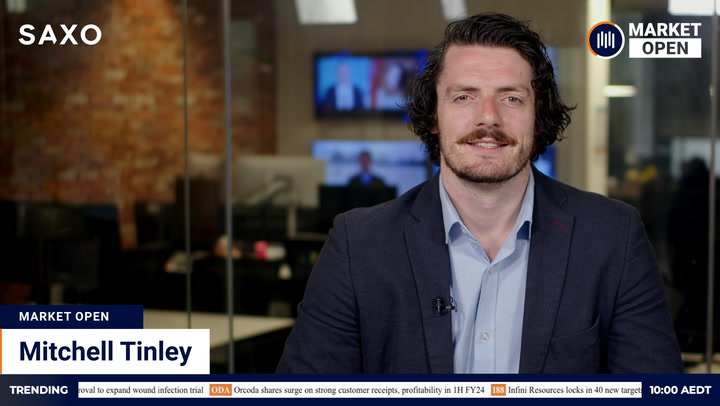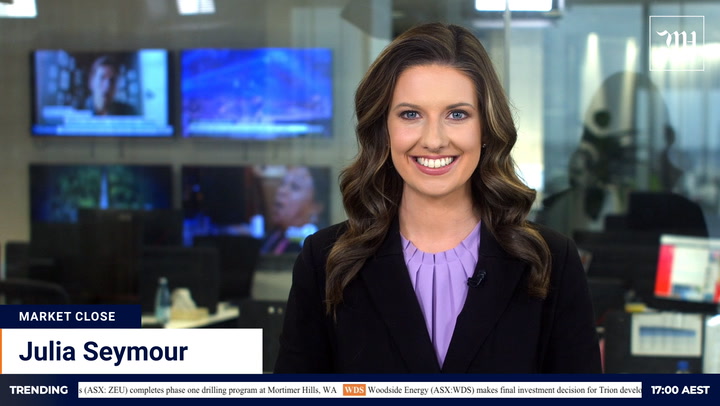A late slump on Wall Street and heavy falls in key commodities point to a downbeat start to Australian trade as recession worries continue to depress buying interest.
ASX futures finished unchanged as Wall Street’s main indices fell away in the final hour of trade.
Oil plunged more than 7 per cent as Covid cases increased in China. Iron ore fell to a seven-month low. Gold and copper touched multi-month lows as a surging US dollar weighed.
The S&P/ASX 200 inched up four points or less than 0.1 per cent yesterday as gains in defensive pockets of the market offset pressure on miners.
Wall Street
A directionless session soured in the final hour as some investors bailed ahead of tonight’s inflation report and quarterly earnings later in the week from major banks.
The S&P 500 declined 36 points or 0.92 per cent. The Dow Jones Industrial Average shed 193 points or 0.62 per cent. The Nasdaq Composite lost 108 points or 0.95 per cent.
As in Australia yesterday, investors appeared to favour traditional havens over riskier assets. The US dollar index tested a fresh two-decade high, raising the cost of dollar-denominated commodity prices for holders of other currencies. The greenback reached parity with the euro for the first time since 2002.
“The surging USD is a symptom of global unease and will make life even more difficult for Corporate America,” wrote Adam Crisafulli of Vital Knowledge.
Treasury yields fell as investors bought bonds. The two- and ten-year yields remained inverted, a classic recession signal. The longer the inversion, remains, the greater likelihood of a recession, according to some commentators.
“Bottom line, the 10s-2s spread is starting to run out of time to turn back positive and simply continue to warn of stagnant growth. If it stays negative and declines further, that’s a clear recession signal from 10s-2s and it’d make us more defensive in equity allocations,” Tom Essaye of The Sevens Report wrote.
Solid earnings from PepsiCo helped settle nerves over the start of a new corporate reporting season. The global drinks and food company raised its revenue outlook as sales of Doritos and Gatorade improved. The company intends to manage rising costs by reducing product sizes and business overheads.
Major banks due to report on Thursday and Friday mostly finished little changed. Morgan Stanley edged up 0.16 per cent. JPMorgan added 0.1 per cent. Wells Fargo eased 0.48 per cent. Citigroup dipped 0.13 per cent.
Tonight’s inflation report is expected to show an increase in headline inflation, but a reduction in the core prices used by the Federal Reserve for rates decisions. Barring a major surprise, the central bank is widely expected to increase the federal funds rate by 75 basis points this month.
A sham consumer price index report circulating on Twitter allegedly contributed to some of last night’s selling. The US Bureau of Labor Statistics dismissed the report as a fake following the close of trade.
Australian outlook
The ASX looks likely to open little changed following a broadly flat end to yesterday’s session. Financial markets are in wait-and-see mode ahead of this week’s key risk events.
The S&P/ASX 200 attempted a rally yesterday, but the early buying could not be sustained in the face of falling commodity prices, the threat of renewed Chinese lockdowns and weak signals from measures of domestic consumer and business confidence. The benchmark slashed an opening 47.5-point rise to a final gain of four points.
The dollar tested a fresh two-year low yesterday amid fears of the impact on the economy of commodity declines. The Aussie bounced 0.26 per cent this morning to 67.58 US cents.
The falling dollar partly accounts for this morning’s stability in ASX futures: a weaker currency should make Australian exports more competitive. The flipside is that a soft dollar is a huge negative for importers.
Energy and tech stocks led the selling on Wall Street. The US energy sector slid 2.03 per cent as crude tumbled. Tech stocks shed 1.34 per cent.
All 11 US sectors declined. Materials was best with a loss of 0.21 per cent. Financials eased 0.65 per cent and industrials 0.32 per cent.
The domestic economic calendar is empty today. China is scheduled to release trade data this session.
Commodities
Oil prices tumbled below US$100 a barrel as an increase in Covid cases in Shanghai sharpened fears of another lockdown. Brent crude settled US$7.61 or 7.1 per cent lower at US$99.49 a barrel. The US benchmark, West Texas Intermediate, dropped US$8.25 or 7.9 per cent to US$95.84.
“Recently, Chinese President Xi Jinping had firmly rejected any departure from the country’s strict zero-Covid strategy,” Carsten Fritsch, commodity analyst at Commerzbank, said.
“This means downside risks to oil demand in China because renewed restrictions on mobility can be expected time and again, depending on case numbers. In the West, the combination of high energy prices and rising interest rates is fueling concerns about a recession that would have a serious impact on oil demand.”
Iron ore fell to a seven-month low amid fears renewed Chinese lockdowns will slow demand for steel. Covid case numbers in Shanghai topped 50 for a fourth day. The government has reintroduced mass testing in parts of the city.
The spot price for ore landed in China dropped US$3.46 or 3.1 per cent to US$108.19 a tonne. The most-traded ore contract on the Dalian Commodity Exchange sank 5 per cent to 707 yuan.
Copper logged its weakest close in the US since November 2020 as a risk-off charge into the US dollar increased prices for buyers using other currencies. Copper for September delivery slumped 14 US cents or 4.2 per cent on Comex to US$3.288 a pound.
On the London Metal Exchange, benchmark copper dropped 3.1 per cent to US$7,335 a tonne. Aluminium fell 0.7 per cent, nickel 2.2 per cent, zinc 0.3 per cent and tin 2.6 per cent. Lead firmed 0.4 per cent.
BHP‘s US-traded depositary receipts declined 1.82 per cent. The miner’s UK stock slipped 1.23 per cent. Rio Tinto gave up 1.02 per cent in the US and 0.65 per cent in the UK.
Gold settled at a nine-month low as the rally in the greenback doused interest in hedges. Metal for August delivery settled US$6.90 or 0.4 per cent lower at US$1,724.80 an ounce. The NYSE Arca Gold Bugs Index shed 2.38 per cent.
“The worst inflationary environment in four decades has not proved helpful for gold prices, which are pacing towards a fresh round of yearly lows versus the U.S. dollar,” Chris Vecchio, strategist at DailyFX, said.





